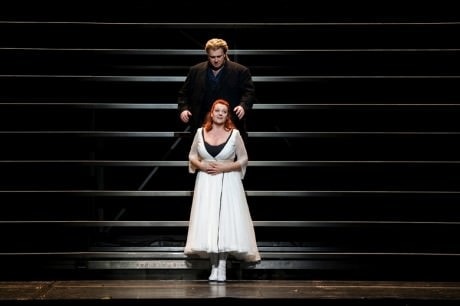
British soprano is making her debut with the Washington National Opera in the role of Isolde in Wagner’s Tristan and Isolde, sharing the role with Swedish soprano Iréne Theorin.
Leslie: You’ve recently taken on, to great acclaim, two of Wagner’s meatiest roles for soprano: Isolde und Brünnhilde, both women of unyielding strength and passion whose love and lovers are doomed, as are they, but whose defeat is, arguably, ultimately a victory – what the Washington Post’s Anne Midgette called “an insoluble yearning that can can only find release and complete consummation in death.”
How do you see Isolde?
Alwyn: I think, you know, having just completed Brünnhilde in Seattle, it all comes back to Isolde. Of all the Wagner heroines, Isolde is the most difficult to play, beyond Sieglinde and Brünnhilde. It’s not about God, like most of Wagner’s operas; in some ways, it’s the most human, although some people think it’s about magic, because of the magic potion. But it’s about human emotions. The music is quite lyrical compared to his other work. Humanity, passion, love and revenge all culminate in Isolde. It’s my personal favorite. A bit of a sweeping statement, but . . . it’s what I was meant to do.
Tristan is just a magical experience. Something everyone can relate to.
How much does your interpretation depend upon the conductor and director and other singers with whom you’re performing?
All of these elements have to come together. And anyone can make suggestions. But it really should be a collaboration, an open dialogue to tell the story you’re trying to tell. In an ideal world, the relationship between the director, the conductor and the performers should be a real marriage. If you work with people who are inspiring, that changes your performance.
I was kind of blown away to see the two lovers lie down on their backs and sing, with no apparent disruption to the quality of the sound. Have you ever done this before? If not, how did you react when you were first told about this?
On this stage, your head is inclined. But the angle is not too steep. Your whole body is supported; you have a sense of gravity and more freedom, with no foundation, on a floating platform, and you can focus on the two characters. They’re supposed to be together; you want to see the intimacy.
I’m always willing to try what the director asks, give it a go. You can work something out together.
I would have preferred more darkness in Act II, where the doomed lovers sing a passionate hymn to their love and to the night, “O sink’ hernieder, Nacht der Liebe.” Did you talk about this with the director? How does the setting influence, if it does, your perception of the scene, your reaction to your partner, and your performance of the role?
It’s a lighting effect, to represent their love and their passion. If it helps to create the mood you’re trying to create, then it’s OK. It’s best to remain in the mood of the scene unless something’s prohibitively dark and you can’t see the conductor.
In a discussion at the Goethe Institute, Director Nick Armfield observed that Tristan is “the only Wagner opera that doesn’t mention God, but it’s the one that everyone says is the most spiritual.” What is it about Tristan—as reflected in your role, or other parts of the opera—that for you makes it especially spiritual?
Wagner was writing of things very close to his heart. At the time he was writing the opera, he didn’t have a very happy life. He didn’t get the love of his life, Mathilde Wesendonck. The spirituality is in that, in the music, and in the text, the subject matter. It’s a marriage of text and music, the personal aspect of what the music meant to him.
You know, he gave the text to Mathilde as a gift. It was a case of unrequited love. Having read all of his letters to Mathilde was an inspiration and a revelation.

What was it like to sing and move on that wire-suspended raked platform?
It’s fine, actually. You have to be barefoot, or have rubber soles on your shoes. It never feels unsafe. It’s big enough and steady enough to feel secure. I love the idea of something floating on water. It’s actually quite functional, and gives you more freedom of movement because you have a new area to play with.
Any final thoughts?
I’m very glad I’m here. I’m really looking forward to introducing myself to a new audience. I want people to know that it’s a magical opera, one that gives me great pleasure to perform and one that I hope they will take pleasure in seeing.
Tristan and Isolde plays through tomorrow night at Washington National Opera at The Kennedy Center’s Opera House – 2700 F St. NW, in Washington, DC. For tickets, call the box office at (202) 467- 4600, or purchase them online.
LINKS
Interview with Ian Storey of ‘Tristan and Isolde’ at Washington National Opera by Leslie Weisman.
Ian Storey’s website.
‘Tristan and Isolde’ at Washington National Opera by Jessica Vaughan review on DCMTA.




